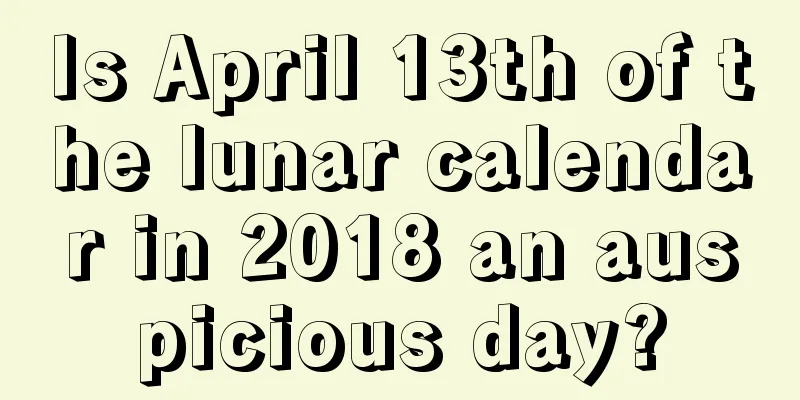When is Jingzhe? What are the customs?

Introduction: People in ancient times liked to divide the solar terms according to the characteristics of the climate. When does Jingzhe usually occur every year? For more details about the 2018 Lunar New Year calendar, please visit the Fortune Teller website for consultation!When is Jingzhe?Jingzhe, also known as "Qizhe" in ancient times, is the third solar term in the 24 solar terms and the beginning of the Mao month in the Ganzhi calendar. The time point is between March 5 and 6 in the Gregorian calendar, when the sun reaches 345° of the ecliptic longitude. "Collected Explanations of the Seventy-two Seasons of the Lunar Calendar" states: "In the second month...all things come out of the shock, which is thunder, so it is called the Waking of Insects, because hibernating insects are startled and flee."The correct time for Jingzhe is between March 5th and 6th in the Gregorian calendar. Some people used to say that "the time point is around the first day of February in the lunar calendar every year", which is wrong. There is a big difference between the lunar calendar and the Gregorian calendar. What are the customs?Offering sacrifices to the White Tiger to resolve disputes According to Chinese folklore, the White Tiger is the god of gossip and disputes. Every year, it comes out on this day to hunt for food and bite people. If you offend this, you will be bullied by evil people throughout the year, hindering your future development and causing all kinds of misfortunes. In order to protect themselves, people offered sacrifices to the White Tiger on the day of Jingzhe. The so-called white tiger sacrifice refers to the worship of a white tiger drawn on paper. The paper tiger is usually yellow with black stripes, and has a pair of fangs painted on the corners of its mouth. During worship, the paper tiger is fed with fat pig blood so that after it is full it will not speak ill of others. Then raw pork is smeared on the mouth of the paper tiger so that it is filled with oil and water and it cannot open its mouth to speak ill of others.The Waking of Zhe is caused by thunder. The ancients imagined that the Thunder God was a great god with a bird's beak, a human body and wings. He held a hammer in one hand and struck many celestial drums surrounding his body with the other hand, making a rumbling thunder. On the day of Jingzhe, the god of thunder beats the celestial drum in heaven, and people on earth also use this opportunity to cover the drum skins. "The Book of Zhou" Volume 40 "Hui Ren" says: "All the time, the drum must be beaten on the day of the awakening of hibernation." Note: "The awakening of hibernation is the first month of spring, when hibernating insects begin to move upon hearing thunder; drum is the symbol; and Mao means covering the drum with leather." It can be seen that not only the ecology of insects is in harmony with the operation of the four seasons, but humans, the most intelligent creatures on earth, must also follow the will of heaven, so that everything can be done with twice the result with half the effort. There is a folk custom of eating pears during the Waking of Insects. There is no trace as to when the custom of eating pears during the Waking of Insects season originated, but the people of Qi County have such a story that has been passed down from generation to generation. Legend has it that the Qu family, a well-known Shanxi merchant family, was descended from Qu Ji, a native of Changzi County, Shangdang. In the early years of Hongwu in the Ming Dynasty, he brought his two sons, Xin and Yi, and traded Shangdang's Lu hemp and pears for Qi County's coarse cloth and red dates. He traveled back and forth between the two places to make a profit. Over time, he saved some money and settled down in Qi County. During the reign of Emperor Yongzheng, the fourteenth generation Qu Baichuan left for the west on the day of Jingzhe. His father took out a pear and asked him to eat it, saying that his ancestors started a business by selling pears, experienced hardships, and settled in Qi County. Today is the Jingzhe day for you to leave for the west, and eating pears means that you will not forget your ancestors and work hard to start a business to bring honor to your family. Qu Baichuan went to the west to do business and became rich, and named the business he opened "Changyuanhou". Later, those who went west also followed suit and ate pears, mostly with the intention of "leaving home to start a business." Even later, pears were eaten on the Waking of Insects Day, with the idea of "working hard to honor ancestors." Summary: The above is [When is Jingzhe? What are the customs? 】, I hope the entire content can be helpful to everyone! |
<<: 2018 Lunar New Year 17th Day God of Happiness Location Query, Where is the God of Happiness?
>>: Is it auspicious to open a store or company on the 17th day of the first lunar month in 2018?
Recommend
What should you pay attention to when visiting graves and paying homage to your ancestors during the Ghost Festival? What should we pay attention to during the Ghost Festival?
Introduction: The Ghost Festival is one of our cou...
What is the day like on September 30th of the lunar calendar in 2021? Can I make a bed?
There are certain considerations when choosing the...
Where is the direction of the God of Happiness on the twelfth day of the ninth lunar month in 2018?
Follow Mr. Shui Mo, who will take you to understa...
Are Ox babies born during the summer solstice in 2021 good or bad? Are they lucky or blessed?
People born in the fifth month of the lunar calend...
2021 Chinese Valentine's Day greetings suitable for WeChat Moments, Chinese Valentine's Day love confession text
The Chinese Valentine's Day is not only a fest...
Is it appropriate to sign a contract on the 12th day of the third lunar month in 2019? Is the fortune good?
The reason for holding a signing ceremony is, on t...
Analysis of the 18th day of the first lunar month in 2022, is it an auspicious day?
In the lunar calendar, days can be divided into au...
What constellation is it on Double Ninth Festival?
Introduction: The Double Ninth Festival is on the ...
Is it better to visit the graves as early as possible during the Qingming Festival? Can’t the hair cover the forehead during the Qingming Festival?
Introduction: Qingming Festival is an important tr...
What is the day like on the fourth day of the second lunar month in 2020? Is traveling okay?
The quality of life is different every day, so let...
Which day in September of the lunar calendar in 2022 is suitable for starting work? What are the requirements for the opening ceremony?
Which day in September of the lunar calendar in 20...
How do you say Christmas in English? What is the meaning of Christmas?
Christmas is a Western holiday, but in recent year...
Is it okay for a baby to be born the day before the Ghost Festival? Which time is best to be born on Ghost Festival?
The fortunes of children born at different times a...
Is the fourth day of the twelfth lunar month in 2020 an auspicious day for signing a contract?
Signing a contract is an important moment, therefo...
Is it not appropriate to pray on the day of the Little New Year in 2020? Is the Little New Year on the 23rd or the 24th?
Introduction: You also need to choose an auspiciou...









